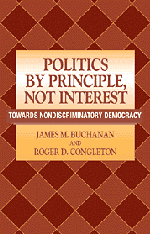Book contents
5 - Generality and the political agenda
Published online by Cambridge University Press: 27 March 2010
Summary
Preceding chapters have been aimed to provide a foundational understanding of and an elementary appreciation for the principle of generality in the politics of democracy. The argument has been developed largely through a series of highly abstract and grossly simplified examples; many critics would perhaps reject the reductionism involved. The purpose of this chapter is different. We shall discuss the relationship of generality to the agenda of political democracy. What conception of politics, as an inclusive enterprise, is required for the generality norm to become a relevant attribute? How does this conception differ from alternative, and possibly more familiar, understandings? Why has the unnatural feature of generality been neglected? What have been the implicit assumptions that have allowed analysts to presume generality where it does not, and indeed cannot, exist?
Responses to these and other like questions suggest a direct linkage between the generality norm and constitutional structure. Although it may seem to be a digression, critical attention must be paid to the implicit understandings in theoretical welfare economics and particularly in the implications for constitutional politics. How can “choices among social states,” a central focus of orthodox analysis, be related to the generality precepts stressed in this book?
The discussion may prompt an offsetting inquiry. Given the unnatural relationship between generality and majoritarian politics, along with the failure of analysts, engaged in both positive and normative exercises, to place such an attribute in any central role, why do we observe any adherence to the principle of generality at all in the politics that we observe?
Here we once again return to the intersection between law and politics. Political action is effectuated through legal action, through changes in laws.
- Type
- Chapter
- Information
- Politics by Principle, Not InterestTowards Nondiscriminatory Democracy, pp. 50 - 58Publisher: Cambridge University PressPrint publication year: 1998

